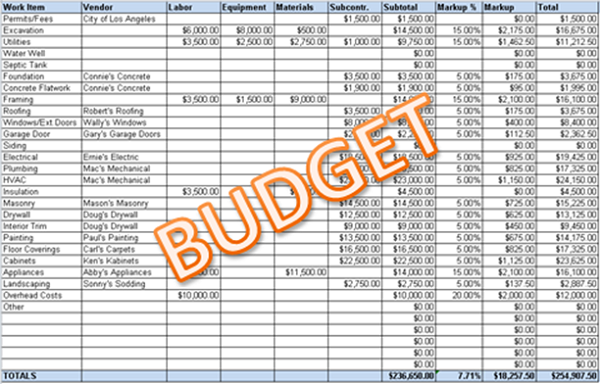Home construction costs may keep rising and soon get out of control if aspiring home-owner don’t draw up a budget before commencing anything to do with the building project. You need to know how much it’ll all cost from start to finish and there is no better way to know than to plan well ahead.

Budget planning must not only address the price of your land and other costs related to the purchase of your lot but also other things like:
Valuation fee
It is good to know that this is rarely added to the loan you plan to obtain, and you may have to take this out of your savings or any other funds you have. The size of the land, its location and its economic value determines the fee charged.
Conveyance fee
A conveyance fee which you will pay to your solicitor. Its cost, like valuation fees, depends on the size and value of the plot, and the extent of works involved in your house building venture.
Stamp duty fee
A percentage of the plot purchase costs. Stamp duties fees are costs you will have to pay so it’s good to remember to plan for this in your budget plan.
Land registry fees
A nominal charge paid by your solicitor.
Building materials
Costs for all building materials that you’ll require for your project.
Labour costs
Cost of labour required to carry out and complete your home construction works.
Put the Building Project out to Tender
If you plan to contract a builder to carry out part or all of the building works, then it’s better to put the job out to tender ensuring you get a few quotes for a fair comparison of your home construction costs. Examine the services each offer, compare their costs and then use the best quotation or the one you feel more comfortable with, for your budgeting purposes.
You may prefer to opt for a ‘turn-key’ package whereby you get a quote for the complete house building project and just collect the keys to your new home on completion.
However, if you prefer to carry out portions of the work, or the whole works yourself (this is not advisable), or intend to work in conjunction with individual tradesmen or skilled workers, then you should get quotes for labour costs of building materials separately, and indicate these figures in your budget.
Employing Skilled Workers for House Construction
There are 2 ways of employing skilled workers for your residential building project. They are:
1) Supply and install
Also referred to as “supply & fix”. Here, the tradesmen will supply all materials required to complete their own part of the project and must ensure they keep the prices they have quoted.
Some skilled workers such as plasterers, joiners, plumbers, electricians, etc., are best employed on this basis and it is a good idea to shop around before finally settling with one.
2) Labour only
If you plan to personally implement any of the trades, or employ skilled workers on a labour-only basis, then materials and labour costs must be planned and budgeted for separately.
You can achieve this by first shopping around a variety of builders merchants stores, or alternatively purchase all the materials you require as a complete package from one of the numerous ‘package suppliers’ of building materials. Many of these companies can even design your residential building if you so wish, and even assist you in working out a workable budget your dream project.
It is good to remember that asides labour and material costs, self-managing and supervising rather than using a builder for this requires budgeting for. Any plant or machinery you may need to hire or purchase such as power tools, scaffolding, concrete mixers, cement mixers, etc.., needs to be budgeted for.
A Budget for Contingencies in Home Construction Costs Estimate
When you have a detailed estimate for your house building costs, add a contingency of 2%. This is important because no matter how well you may have planned and budgeted, you can be sure that other totally unexpected costs and obligations will surface as construction works progress.
This contingency that must be set aside will come in really useful. If for example, a great idea suddenly arises during the course of building, you can use part of these funds to implement it. Many of the best features inbuilt (or even refurbished) homes were creatively developed by exploiting ideas that developed in the course of construction works on features that were revealed after work had commenced.
Planning and budgeting to ensure you are working with detailed figures and information are invaluable. When you commence building and have to implement your budget details, you’ll be able to assess and subsequently account for the amount of cash flow you are spending to meet all costs during the duration of the project.
Finally, it is important to note that serious planning and realistic budgeting of your home construction costs will guarantee a successful implementation of your project, keeping you within your drawn up budget limits without much stress.
Further Reading:
Small Home Designs – 21st Century Homeowners Trend
What Comes in Home Plans and Blueprints Packages?
12 Things Dream Homes Have In Common